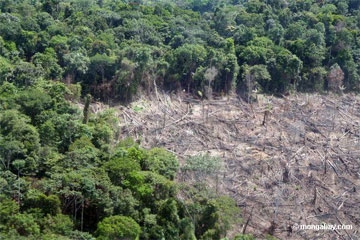Important safeguards to protect natural forests are still lacking in negotiating text on REDD, a proposed mechanism for mitigating climate change by paying developing countries to keep trees standing, reports an alliance of activist groups.
The Ecosystems Climate Alliance (ECA) — a group made up of Global Witness, the Rainforest Action Network, The Wilderness Society, the Environmental Investigation Agency, Wetlands International, the Humane Society International, Rainforest Foundation Norway, and Rainforest Foundation UK — warns the latest text (Non-Paper No. 39), released on Thursday afternoon, “contains no provisions to monitor vital safeguards in developing countries which will receive funding to implement REDD, nor any explicit language that will ensure an objective of protecting intact natural forests in those countries.”
|
|
A statement released by the group says that a key safeguard “against the conversion of natural forests to forest plantations” — which vanished at the Bangkok talks in October — has been reinstated but “severely weakened” while protections against ongoing degradation of peatlands, which store massive amounts of carbon and account for 3 percent of global greenhouse gas emissions, are lacking.
“Still missing is the vital objective of protecting intact natural forests in REDD,” Peg Putt of The Wilderness Society said in a statement. “Without this safeguard, REDD monies projected to preserve tropical forests could instead allow industrial-scale logging and replacement of forests with pulp or palm oil plantations.”
“A REDD mechanism that does not provide adequate incentives to protect and rewet organic soils ignores very high and ongoing emissions that result from deforestation and forest degradation,” said Susanna Tol of Wetlands International. “It could also stimulate and reward plantations on yet deforested and drained soils (and other ecosystems) with significant carbon stocks resulting in large emissions.”
ECA says the text includes “decidedly weak” language on the rights and participation of indigenous and forest dependent peoples under REDD. The group also warns that developed countries are revising the text so they too can cash in on forestry-related credits.
“Parties have put forward various loopholes in the LULUCF [Land Use, Land-Use Change and Forestry] text that will allow each to arbitrarily adjust its own reference level for measuring greenhouse gas emissions from forest management, undermining their emissions targets under the Kyoto Protocol,” said the ECA statement.
“Developed countries will bring their Christmas wish lists to Copenhagen,” said Rebecca Ettlinger of Nepenthes, “so developing nations must plan to scrutinize their requests closely to avoid these undermining the integrity of the climate deal by hiding emissions or claiming fraudulent credits.”
ECA says REDD must include “safeguards for transparent forest governance structures and support mechanisms; safeguards for the rights of indigenous peoples and local communities; safeguards on conservation of biological diversity and enhancement of ecosystem services; [and] an objective for protecting intact natural forests.”








